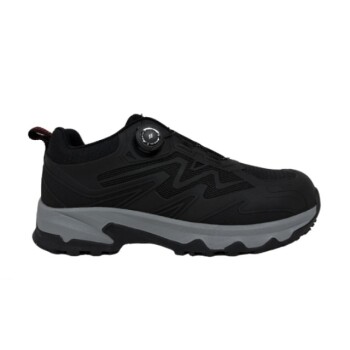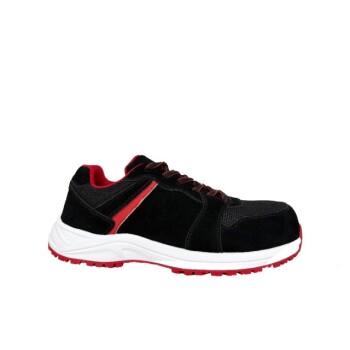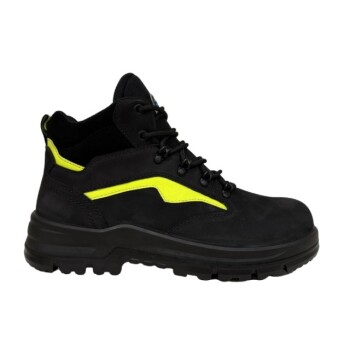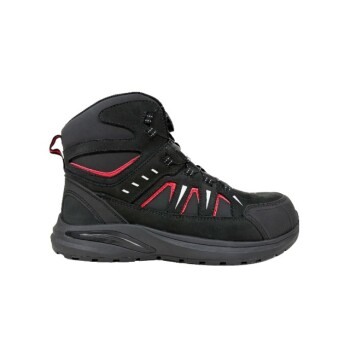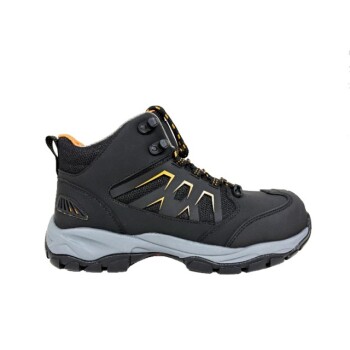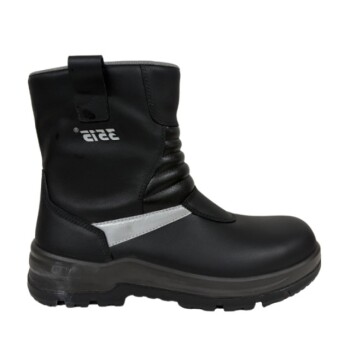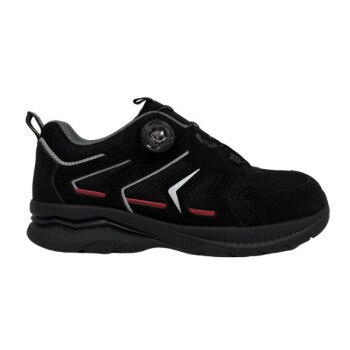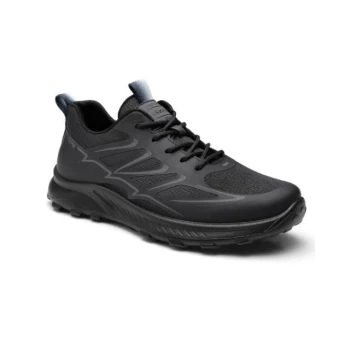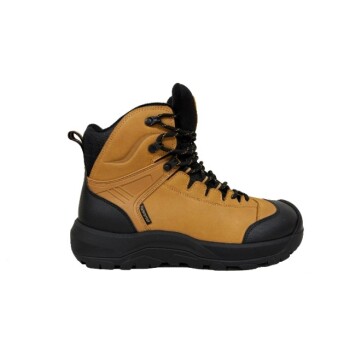The primary advantages are superior design, specialized materials, and tested reliability. Premium slip-resistant shoes are engineered as a complete safety system, whereas modifying a standard shoe creates an inconsistent and unpredictable solution that can fail when you need it most.
While modifying a shoe might seem like a cost-effective shortcut, it introduces significant risks. True safety comes from an integrated system where the outsole material, tread design, and overall shoe construction work together for proven, consistent slip resistance.
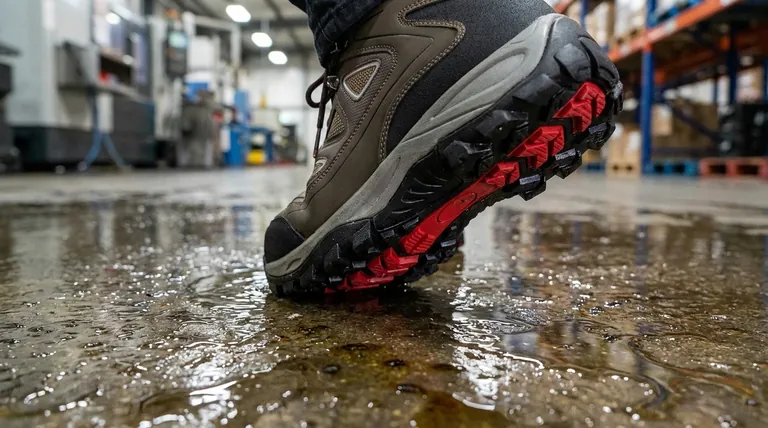
The Anatomy of True Slip Resistance
A common misunderstanding is that slip resistance is just about having a "grippy" sole. In reality, it is a sophisticated engineering solution designed to manage friction on hazardous surfaces.
Engineered Outsole Design
The specific shape of the tread is critical. Premium slip-resistant shoes use interlocking tread patterns, often hexagonal or circular.
These shapes are not for aesthetics; they are designed to actively channel water, oil, and other liquids away from the bottom of your foot. This prevents a layer of fluid from forming between the shoe and the floor, which is the primary cause of hydroplaning and slips.
The Importance of Tread Depth
The grooves in the outsole must be deep enough to provide a high-friction contact point with the ground.
These deeper channels create more surface area and bite into the floor, ensuring a secure grip even when the surface is contaminated. Shallow or worn-down treads cannot provide this level of friction.
Material Science at Play
Standard shoe soles are often made of harder rubber compounds designed for durability on dry surfaces. This is a liability on wet or greasy floors.
Slip-resistant shoes use a high-grade, softer rubber compound. This material is specifically formulated to maintain its grip and flexibility on slick surfaces, providing a reliable connection that harder materials simply cannot match.
Beyond the Sole: A Complete Safety System
Effective footwear is more than just its outsole. Premium shoes are designed holistically to protect the user in demanding environments.
Integrated Foot Protection
These shoes are built to be sturdy. The entire construction is designed to prevent injuries, providing a stable platform that protects your foot from more than just slips.
Built-in Arch Support
Slip-resistant shoes are typically work shoes, meant to be worn for long, demanding shifts.
They are designed with superior arch support and cushioning to reduce fatigue. This is a critical safety feature, as a tired worker is more prone to stumbles, trips, and other accidents.
Understanding the Trade-offs: The Flaws of Modification
Attempting to add slip resistance to a standard shoe is fundamentally different from using a shoe engineered for that purpose. This approach introduces significant and often unseen risks.
Inconsistent Performance
Add-on grips, sprays, or abrasive coatings wear down quickly and unevenly. This creates a false sense of security where one part of the shoe may grip while another slips, leading to unpredictable behavior.
Compromised Shoe Integrity
Standard shoes are not designed to accommodate modifications. Applying adhesives or altering the sole can damage the shoe's original structure, causing it to fall apart or become uncomfortable.
The Risk of Catastrophic Failure
This is the most critical point. A modification is an attachment, not an integrated system. It can peel off, wear through, or simply fail at the worst possible moment, offering zero protection when a slip occurs. A purpose-built shoe is tested for reliability under stress.
Making the Right Choice for Your Safety
Your decision should be based on your environment and the level of risk you are willing to accept.
- If your primary focus is maximum safety and reliability in a professional setting: Invest in premium, purpose-built slip-resistant shoes, as they are a proven piece of safety equipment.
- If your primary focus is a temporary, low-cost solution for infrequent, low-risk situations: A modification may seem adequate, but you must accept the trade-offs in reliability and the potential for sudden failure.
Ultimately, investing in professionally engineered footwear is a direct investment in your personal safety and well-being.
Summary Table:
| Feature | Premium Slip-Resistant Shoes | Modified Standard Shoes |
|---|---|---|
| Safety Reliability | Engineered & tested as a complete system | Inconsistent, unpredictable performance |
| Outsole Design | Interlocking treads channel liquids away | Generic, non-specialized tread |
| Material Quality | Soft, high-grade rubber for grip | Harder rubber designed for durability, not slip resistance |
| Long-Term Value | Durable construction with arch support | Risk of damage and premature failure |
| Risk of Failure | Low, tested for reliability | High, potential for catastrophic failure |
Invest in Unmatched Safety and Reliability with 3515
As a large-scale manufacturer, 3515 produces a comprehensive range of premium, purpose-built work footwear for distributors, brand owners, and bulk clients. Our production capabilities encompass all types of safety shoes and boots, engineered from the ground up for maximum slip resistance and worker protection.
Don't compromise on safety with temporary fixes. Ensure your team is equipped with footwear that provides proven, consistent performance. Let's discuss your needs and how our specialized manufacturing can deliver the safety solutions you require.
Contact our experts today to request a catalog or discuss a custom order!
Visual Guide
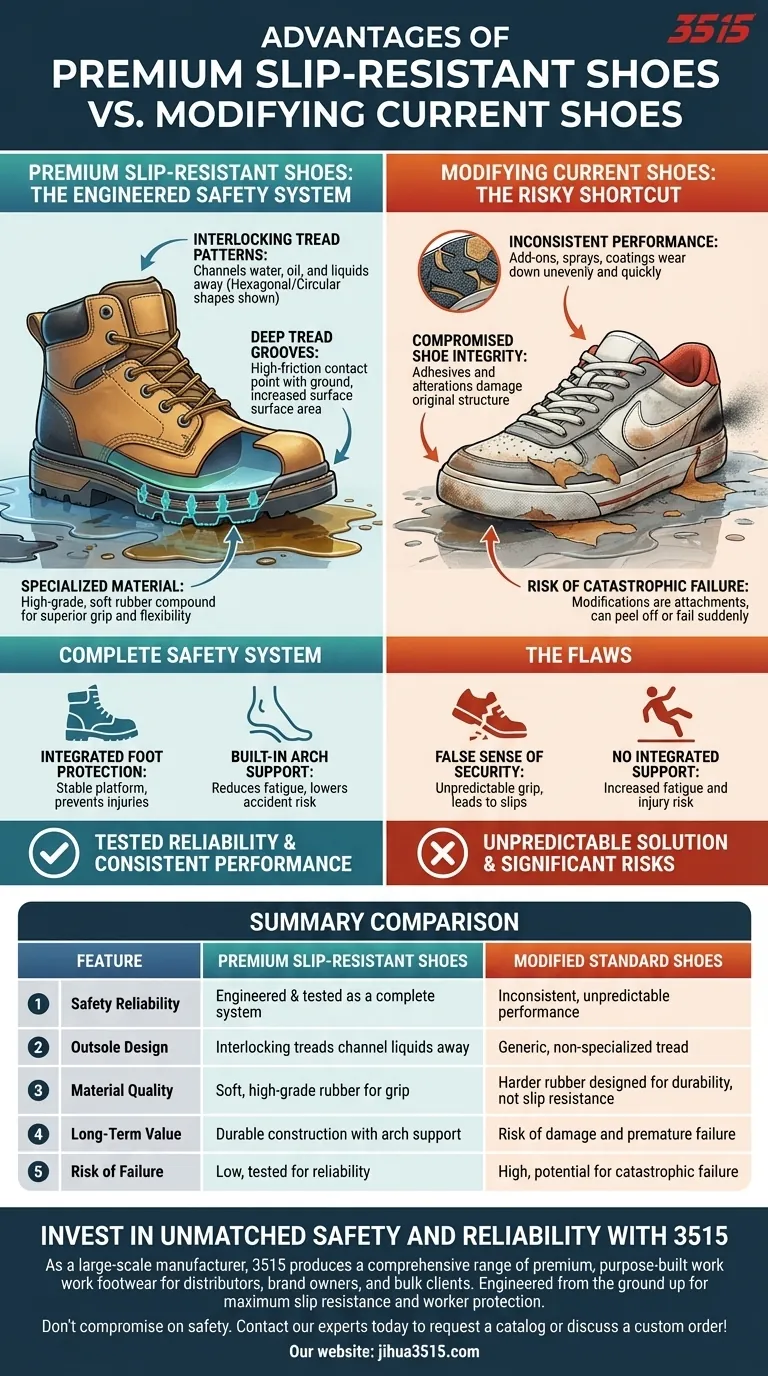
Related Products
- Safety Footwear Wholesale Manufacturer for Custom OEM/ODM Production
- Advanced KPU Athletic Safety Shoe with Steel Toe Cap Anti-Slip Rotary Lacing System
- Premium Suede Sport Safety Shoes for Wholesale & Bulk Orders
- Wholesale Safety Footwear Manufacturer for Bulk & Custom OEM Orders
- Wholesale Customizable Safety Boots Durable & Protective Footwear Manufacturing
People Also Ask
- What types of workers might encounter slippery conditions indoors? Identify High-Risk Roles
- How can footwear reduce slip, trip, and fall risks? Match Your Shoes to the Hazard
- Why are slip-resistant work shoes important in the workplace? Prevent Costly Slips and Falls
- How do specialized traction patterns in non-slip shoes work? The Science of Water Displacement
- What industries require non-slip shoes? Protect Your Workforce in High-Risk Environments
- How do non-slip protective shoes reduce accident rates in industrial workshops containing debris and scattered tools? Enhance Workshop Safety & Stability
- What are the advantages of visiting a cobbler for non-slip shoe solutions? Get a Professional, Durable Fix
- How does outsole thickness contribute to slip resistance? The Truth About Material & Tread Design

